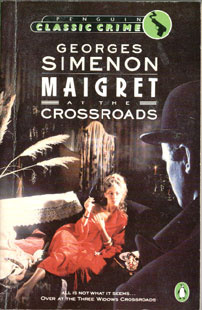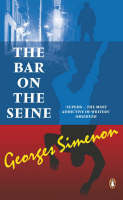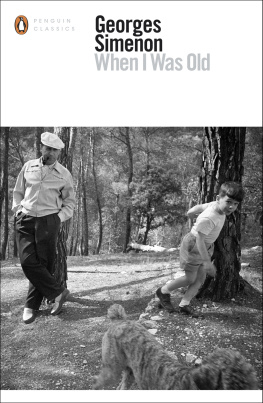Georges Simenon - Maigret at the Crossroads
Here you can read online Georges Simenon - Maigret at the Crossroads full text of the book (entire story) in english for free. Download pdf and epub, get meaning, cover and reviews about this ebook. year: 1963, publisher: Penguin (Non-Classics), genre: Detective and thriller. Description of the work, (preface) as well as reviews are available. Best literature library LitArk.com created for fans of good reading and offers a wide selection of genres:
Romance novel
Science fiction
Adventure
Detective
Science
History
Home and family
Prose
Art
Politics
Computer
Non-fiction
Religion
Business
Children
Humor
Choose a favorite category and find really read worthwhile books. Enjoy immersion in the world of imagination, feel the emotions of the characters or learn something new for yourself, make an fascinating discovery.
- Book:Maigret at the Crossroads
- Author:
- Publisher:Penguin (Non-Classics)
- Genre:
- Year:1963
- Rating:4 / 5
- Favourites:Add to favourites
- Your mark:
- 80
- 1
- 2
- 3
- 4
- 5
Maigret at the Crossroads: summary, description and annotation
We offer to read an annotation, description, summary or preface (depends on what the author of the book "Maigret at the Crossroads" wrote himself). If you haven't found the necessary information about the book — write in the comments, we will try to find it.
Maigret at the Crossroads — read online for free the complete book (whole text) full work
Below is the text of the book, divided by pages. System saving the place of the last page read, allows you to conveniently read the book "Maigret at the Crossroads" online for free, without having to search again every time where you left off. Put a bookmark, and you can go to the page where you finished reading at any time.
Font size:
Interval:
Bookmark:
Maigret at the Crossroads
La nuit du carrefour
the 7th episode in the Maigret Saga
1931
Georges Simenon
Translated from the French by Robert Baldick
A 3S digital back-up edition 1.0
Contents
Georges Simenon was born at Lige in Belgium in 1903. At sixteen he began work as a journalist on the Gazette de Lige . He has published over 212 novels, in his own name, eighty of which belong to the Inspector Maigret series, and his work has been published in thirty-two countries. He has had a great influence upon French cinema, and more than forty of his novels have been filmed.
Simenons novels are largely psychological. He describes hidden fears, tensions and alliances beneath the surface of lifes ordinary routine, which suddenly explode into violence and crime. Andr Gide wrote to him: You are living on a false reputation just like Baudelaire or Chopin. But nothing is more difficult than making the public go back on a too hasty first impression. You are still the slave of your first successes and the readers idleness would like to put a stop to your triumphs there You are much more important than is commonly supposed, and Franois Mauriac wrote, I am afraid I may not have the courage to descend right to the depths of this nightmare which Simenon describes with such unendurable art.
Simenon has travelled a great deal and once lived on a cutter, making long journeys of exploration round the coasts of Northern Europe. He is married and has four children, and lives near Lausanne in Switzerland.
TRANSLATED BY ROBERT BALDICK
PENGUIN BOOKS
Penguin Books Ltd, Harmondsworth, Middlesex, England Penguin Books, 625 Madison Avenue, New York, New York10022, U.S.A.
Penguin Books Australia Ltd, Ringwood, Victoria, Australia
Penguin Books Canada Ltd, 2801 John Street, Markham, Ontario, Canada L3R ib4
Penguin Books (N.Z.) Ltd, 182-
190 Wairau Road, Auckland 10, New ZealandLe Nuit du carrefour first published 1931
This translation first published in Penguin Books 1963
Reprinted 1963, 1970, 1972, 1974, 1975, 1977, 1979
Copyright A. Fayard et Cie, 1931 Translation copyright (Q) the Estate of Robert Baldick, 1963
All rights reserved
Made and printed in Great Britain by Hazell Watson & Viney Ltd,
Aylesbury, Bucks Set in Monotype Van Dijck
Except in the United States of America, this book is sold subject to the condition that it shall not, by way of trade or otherwise, be lent, re-sold, hired out, or otherwise circulated without the publishers prior consent in any form of binding or cover other than that in which it is published and without a similar condition including this condition being imposed on the subsequent purchaser
MAIGRET AT THE CROSSROADS
Chapter 1
The Black Monocle
When, with a sigh of relief, Maigret pushed his chair back from the desk at which he had been sitting, the interrogation of Carl Andersen had lasted exactly seventeen hours.
Through the uncurtained windows he had seen the crowd of midinettes and office-workers storming the dairy-shops in the Place Saint-Michel at noon, then the bustle dying down, the six oclock rush towards the Mtro and the railway stations, and the dawdling over apritifs
Mist had covered the Seine. The last tug had gone by, carrying green and red lights and towing three barges. The last bus. The last Mtro. The cinema whose grille was closed after the advertisement boards had been taken in
And the stove which seemed to be purring more loudly in Maigrets office. On the table there were some empty beer-glasses and the remains of some sandwiches.
A fire must have broken out somewhere, for they heard the noisy fire-engines going past. There was also a raid. The Black Maria drove out of the Prefecture about two oclock, and came back later by way of the depot yard, where it unloaded its booty.
The interrogation went on and on. Every hour, or every two hours, depending how tired he was, Maigret would press a button. Sergeant Lucas, who was dozing in a near-by office, would come in, glance at the chief-inspectors notes, and take over.
And Maigret would go and lie down on a camp-bed, returning to the attack with new stocks of energy.
The Prefecture was deserted. A few comings and goings in the Vice Squad. A drug pedlar whom an inspector brought in about four oclock in the morning and started questioning straight away.
The Seine donned a halo of milky mist which turned white, and it was daybreak, lighting up the empty embankments. Footsteps sounded in the corridors. Telephones ringing. Voices calling. Doors banging. The charwomens brooms.
And Maigret, putting down his overheated pipe on the table, stood up and looked the prisoner over from head to foot, with an irritation not unmixed with admiration.
Seventeen hours of unrelenting interrogation. Beforehand the mans shoelaces, collar, and tie had been removed and his pockets emptied.
During the first four hours he had been left standing in the middle of the office, and questions had been fired as fast as machine-gun bullets.
Are you thirsty?
Maigret was on his fourth glass of beer and the prisoner had given a shadow of a smile. He had drunk greedily.
Are you hungry?
He had been asked to sit down, then to stand up again. He had gone seven hours with nothing to eat, and after that he had been harried while he was bolting down a sandwich.
There were two of them taking it in turns to question him. Between sessions they could doze, stretch themselves, escape from the obsession of this monotonous interrogation.
And it was they who were giving up! Maigret shrugged his shoulders, looked for a cold pipe in a drawer, wiped his moist forehead.
Perhaps what impressed him most of all was not the mans physical and moral resistance, but the disturbing elegance, the distinction which he retained to the end.
A man of the world who emerges from the search-room without his tie, and who then spends a whole hour, stark naked, with a hundred criminals, in the Records Department, dragged along from the camera to the armchair scales, jostled around, and subjected to the depressing jokes of some of his companions, rarely retains that self-assurance which, in private life, formed part of his personality.
And when he has undergone a few hours of questioning, it is a positive miracle if anything remains to distinguish him from a common tramp.
Carl Andersen had not changed. In spite of his crumpled suit, he still displayed an elegance such as the staff of Police Headquarters rarely have occasion to appreciate, an aristocratic elegance, with that hint of stiffness and restraint, that touch of haughtiness which is the peculiar attribute of diplomatic circles.
He was taller than Maigret, broad-shouldered, but slim, lithe, and narrow-hipped. His long face was pale, his lips rather colourless.
He wore a black monocle in his left eye.
Take it out, he had been told.
He had obeyed, with a ghost of a smile. He had uncovered a glass eye of unpleasant fixity.
An accident?
Yes, a flying accident
So you were in the war?
Im Danish. I didnt have to fight. But I had a private aircraft back there
This artificial eye was so embarrassing, in a young face with regular features, that Maigret had growled:
You can put your monocle back.
Andersen had not complained once, either that they had kept him standing, or that they had forgotten to give him anything to eat and drink. From his place he could see the people in the street, the trams and buses crossing the bridge, a ray of reddish sunshine towards evening, and now the bustle of a bright April morning.
Next pageFont size:
Interval:
Bookmark:
Similar books «Maigret at the Crossroads»
Look at similar books to Maigret at the Crossroads. We have selected literature similar in name and meaning in the hope of providing readers with more options to find new, interesting, not yet read works.
Discussion, reviews of the book Maigret at the Crossroads and just readers' own opinions. Leave your comments, write what you think about the work, its meaning or the main characters. Specify what exactly you liked and what you didn't like, and why you think so.












